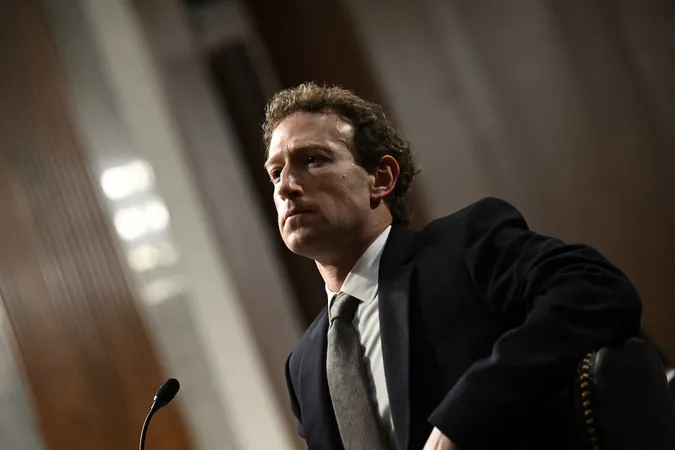
Meta Shifts Gears: Ends Fact-Checking Amid Trump Alignment - What It Means for Social Media
2025-01-07
Author: Olivia
Meta's Discontinuation of Fact-Checking Program
In a surprising move, Meta Platforms Inc., the parent company of Facebook and Instagram, has announced that it will be discontinuing its fact-checking program. This decision aims to align more closely with the policies anticipated from the incoming Trump administration, signaling a significant shift in how social media platforms handle misinformation and user-generated content.
Introduction of Community Notes System
On Tuesday, Meta shared that it will replace its independent fact-checking initiative with a community notes system, reminiscent of features seen on X (formerly Twitter). This new model allows users to contribute notes on posts that may contain misleading information, effectively placing a greater emphasis on community engagement over expert evaluation. Meta's leadership stated that earlier fact-checking processes led to excessive censorship, as they were influenced by the biases of third-party evaluators.
Rolling Out Changes
The transition to the community notes system will roll out over the next few months, initially targeting users in the United States. In addition, Meta plans to lift restrictions on several contentious topics, including immigration and gender, allowing for wider discourse on political and social issues.
Meta CEO's Vision
Meta CEO Mark Zuckerberg pointed to the recent U.S. elections as a 'cultural tipping point,' explaining, 'We're going to work with President Trump to push back on governments around the world that are going after American companies and pushing for more censorship.'
Experts Weigh In
Experts suggest that Meta’s latest decisions reflect a growing global trend of aligning business practices with the political climate under a Trump presidency. Michael Geist, a law professor at the University of Ottawa, emphasizes that Canada’s digital content policies might soon face pressures for a shift, especially if a Conservative government comes to power. The Conservative Party’s approach appears to resonate with Meta's tactics, promoting a narrative against perceived censorship within digital policy.
Historical Context of Fact-Checking at Meta
Historically, Meta began its fact-checking efforts in December 2016, in response to criticisms regarding the spread of 'fake news' following Trump's election. The company initially partnered with over 100 organizations across 60 languages to combat misinformation on its platforms.
Concerns Over Community Notes
However, the reliance on community notes may not enhance the quality of information shared on social media. Samantha Bradshaw, an assistant professor at American University, argues that while public participation can offer valuable context, it does not intrinsically advance free speech. 'Fact-checking isn’t merely about freedom of speech; it’s about providing context and aiding informed political discourse,' she stated.
Impact of Elon Musk's Acquisition of X
Elon Musk's acquisition of X in 2022 marked a pivotal change in the social media landscape, fostering an environment for the rampant spread of misinformation without severe repercussions. This context makes Meta's new strategy seem like part of an escalating trend among tech companies retrenching from content moderation responsibilities.
Board of Directors Changes
In addition to its policy changes, Meta has recently strengthened its board of directors by electing Dana White, a known associate of Trump and the CEO of the Ultimate Fighting Championship (UFC). This appointment reflects a deeper connection to Trump's inner circle, with another high-profile Republican, Joel Kaplan, stepping in as Meta's chief global affairs officer.
Conclusion
As Meta embarks on its new direction, users and observers alike are left questioning the implications these changes might bring—not just for the platforms, but for the vitality of online discourse in an increasingly polarized world.



 Brasil (PT)
Brasil (PT)
 Canada (EN)
Canada (EN)
 Chile (ES)
Chile (ES)
 Česko (CS)
Česko (CS)
 대한민국 (KO)
대한민국 (KO)
 España (ES)
España (ES)
 France (FR)
France (FR)
 Hong Kong (EN)
Hong Kong (EN)
 Italia (IT)
Italia (IT)
 日本 (JA)
日本 (JA)
 Magyarország (HU)
Magyarország (HU)
 Norge (NO)
Norge (NO)
 Polska (PL)
Polska (PL)
 Schweiz (DE)
Schweiz (DE)
 Singapore (EN)
Singapore (EN)
 Sverige (SV)
Sverige (SV)
 Suomi (FI)
Suomi (FI)
 Türkiye (TR)
Türkiye (TR)
 الإمارات العربية المتحدة (AR)
الإمارات العربية المتحدة (AR)